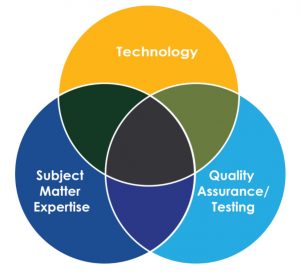
A lot has changed since I began staffing test projects. From hiring college students and interns for summer testing programs, to building networks of offshore teams around the world, and from having 24-hour work schedules to having instant crowdsourced public beta or bug bounty testing—things have changed.
Development methods and technologies have changed drastically, and so have the variety of staff solutions for testing. What hasn’t changed is the need to do more with less. Go faster, but with smarter testing. By the way, “automate everything.”
The expectation for automation is as unrealistic as ever. In minimal time, we want to build “bug-free software” to exceed our customer’s expectations and to provide them with an amazing user experience. This is simply a herculean effort.
Building a team that has the skills to make this happen has always been challenging. In today’s global economy, with organizations fighting over fully-skilled staff, the challenge is even greater.
Deciding who gets hired as Quality Engineers or Testers in the US has always been part art and part science. We have used this diagram in the past to look at which skills to build. It is also used to help you, as a manager, staff a team.
 Technical skill, subject matter knowledge, QA/testing skills
Technical skill, subject matter knowledge, QA/testing skills
Every test team requires technical skill(s):
- Someone must be technically knowledgeable enough to test effectively. For automating and gray box testing, technicians must have knowledge of the development platform, technology (client server or IoT or mobile or medical device or browser or embedded system, etc.), as well as some coding and scripting skills.
- Someone must be knowledgeable about browsers, operating systems, analytics, databases, etc.
- Others need to be technological generalists, aka enough to be dangerous.
A successful team needs subject matter experts. If you are testing FinTech, the team doing the work must understand how asset management works, and how loans work—the origination, the payouts, what users need and do to get a loan, etc. I have seen this skill be the deciding hiring factor more than any other skill. It is often the tie-breaker.
The team you build needs to have excellent testing and quality assurance skills. This skill set is often taken for granted. Being able to write a complete and excellent bug report without relying on a screenshot and effectively communicating test coverage are valuable, overlooked skills.
Each member of the team must comprehend the need, purpose, and reason for test cases. In addition to being quality advocates, a few members of the test group need to know how to write a test plan and know why a Lean test plan is critical. Additionally, they must know what measures—with the inclusion of burn down and velocity—a team can look at for quality improvement, and understand an array of test methods and techniques to solve various testing situations.
Looking for all three of these diverse skill sets in one person is like looking for a purple squirrel; it is nearly impossible so when you find it, grab it and don’t let go! Most often, you’ll need to weigh and counterbalance these skills to fill a team, in hopes of obtaining the full array of skills needed across the team.
Getting this skill set through staffing will impact the method you use to staff your organization. On one extreme, you can hire a subject matter expert, perhaps at a high salary, and train them to obtain the rest of the essential skills.
You could find subject matter experts internally and outsource testing and testing skill—a very common solution. On the other hand, you could crowdsource and get what you get.
Do not make the mistake of assuming that everyone working in technology has the necessary technical skills, and that individuals working in testing are equipped with great testing skills. With so few well-trained quality experts and such high demand for skilled technicians, staffing can be very difficult.
This December issue of LogiGear Magazine features a case study of LogiGear’s efforts to create an Innovation Lab for its offshore team, an infographic that covers 5 steps to a successful software testing service engagement, and a special Blogger of the Month on AI testing. We hope you enjoy perusing the articles, as our goal was to start a modernized discussion on staffing and outsourcing in the 21st century.

















